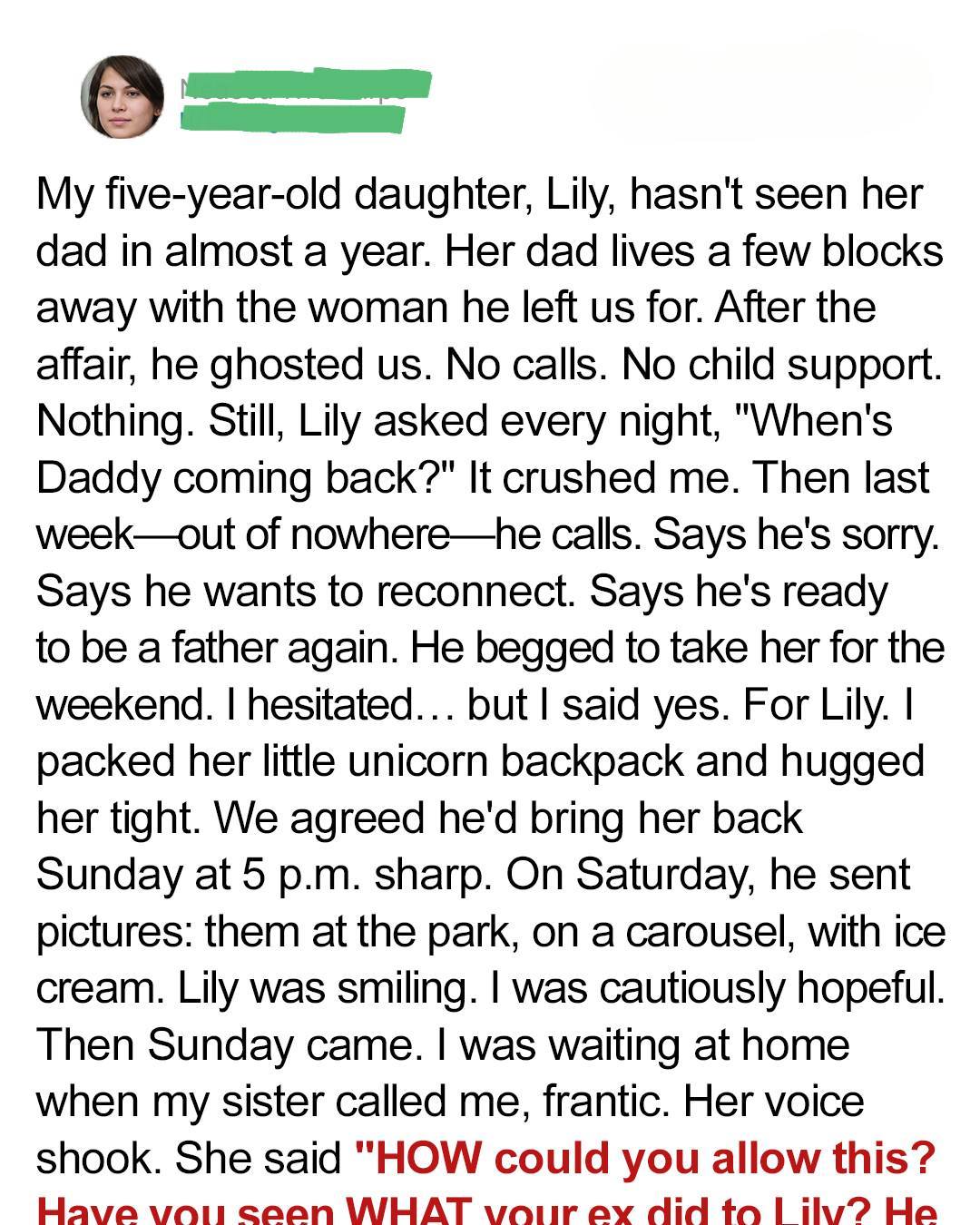When my ex-husband, Leo, called saying he wanted to spend time with our daughter, Lily, I felt a flicker of hope I hadn’t felt in years. It had been three long years since he’d been present in her life—three years of missed birthdays, unanswered calls, and quiet bedtime tears when she asked why Daddy never showed up. So when he said he wanted to “make things right” and take her for a weekend, I wanted to believe him.
Part of me, the part that remembered the day Lily was born, when Leo cried and promised he’d be the best father possible, whispered that maybe he’d changed. Against all my cautious instincts, I said yes.
I packed Lily’s little yellow backpack myself—pajamas, snacks, her favorite book, the teddy bear she never slept without. I kissed her forehead and told her to have fun. She was thrilled—she hadn’t seen her father in years.
Saturday afternoon, I received a photo from Leo: Lily, laughing at a park, hair flying in the wind. For a moment, I let myself believe he really had changed.
But Sunday shattered that illusion.
The Call That Broke My Heart
I was folding laundry when my sister called, her voice tight. “You need to see this. Now.”
I opened the link she sent and froze. There was Leo, in a sharp suit, standing under a floral arch with a woman in a white dress. A wedding. And there was Lily, our daughter, dressed in white, a crown of baby’s breath in her hair, scattering petals down the aisle.
She wasn’t just present—she was the flower girl.
Leo hadn’t told me a word about a wedding. He had said the weekend was about reconnecting with Lily, but it wasn’t. It was about appearances—about looking like the perfect father.
Racing There
Without thinking, I grabbed my keys and drove. The venue was thirty minutes away, but the drive felt endless. My heart pounded, and anger and heartbreak collided.
When I arrived, the ceremony was over. Guests mingled and laughed. Lily sat alone on a bench, clutching her teddy bear, legs swinging, looking small and lost. My chest ached.
I knelt beside her. “Hey, baby.”
Her eyes widened. “Mommy?”
I pulled her close. “You’re safe now. You didn’t do anything wrong.”
Confronting Leo
Leo approached nervously. “Hey, I was just about to call—”
I stood, holding Lily. Calm but firm, I said, “You don’t involve our daughter in weddings, photos, or appearances without her understanding and my permission.”
He mumbled about a “misunderstanding,” but the damage was done. Parenting isn’t a performance—it’s about presence, commitment, and care.
The Hard Truth About Hope
Sharing a child with someone who has hurt you makes hope both tempting and dangerous. We want to believe people can change, but sometimes they only return when it benefits them. Leo’s idea of fatherhood was about optics, not responsibility.
Protecting What Matters
Back home, I tucked Lily into bed. She hugged her teddy bear and whispered, “Mommy, was Daddy mad at me?”
“No, sweetheart. He made a mistake. But you didn’t do anything wrong.”
I contacted my lawyer the next morning. From now on, no unsupervised visits. If Leo wants to be part of Lily’s life, he must prove he can respect her—and me.
He hasn’t called since. And that’s okay.
What Love Really Means
Love isn’t about photos, appearances, or approval from others. It’s quiet, patient, and consistent. It’s brushing hair from a sleepy child’s face, holding their hand when they’re scared, listening when they need to talk. Love is protection, presence, and respect.
Lily is home now—laughing, playing, painting rainbows on her bedroom window. She’s safe, healing, and loved.
One day, maybe Leo will grow into the father she deserves. Maybe not. Either way, she has mine—steady, unconditional, and present.
Because love isn’t a photo opportunity. It isn’t a performance. It’s real.
